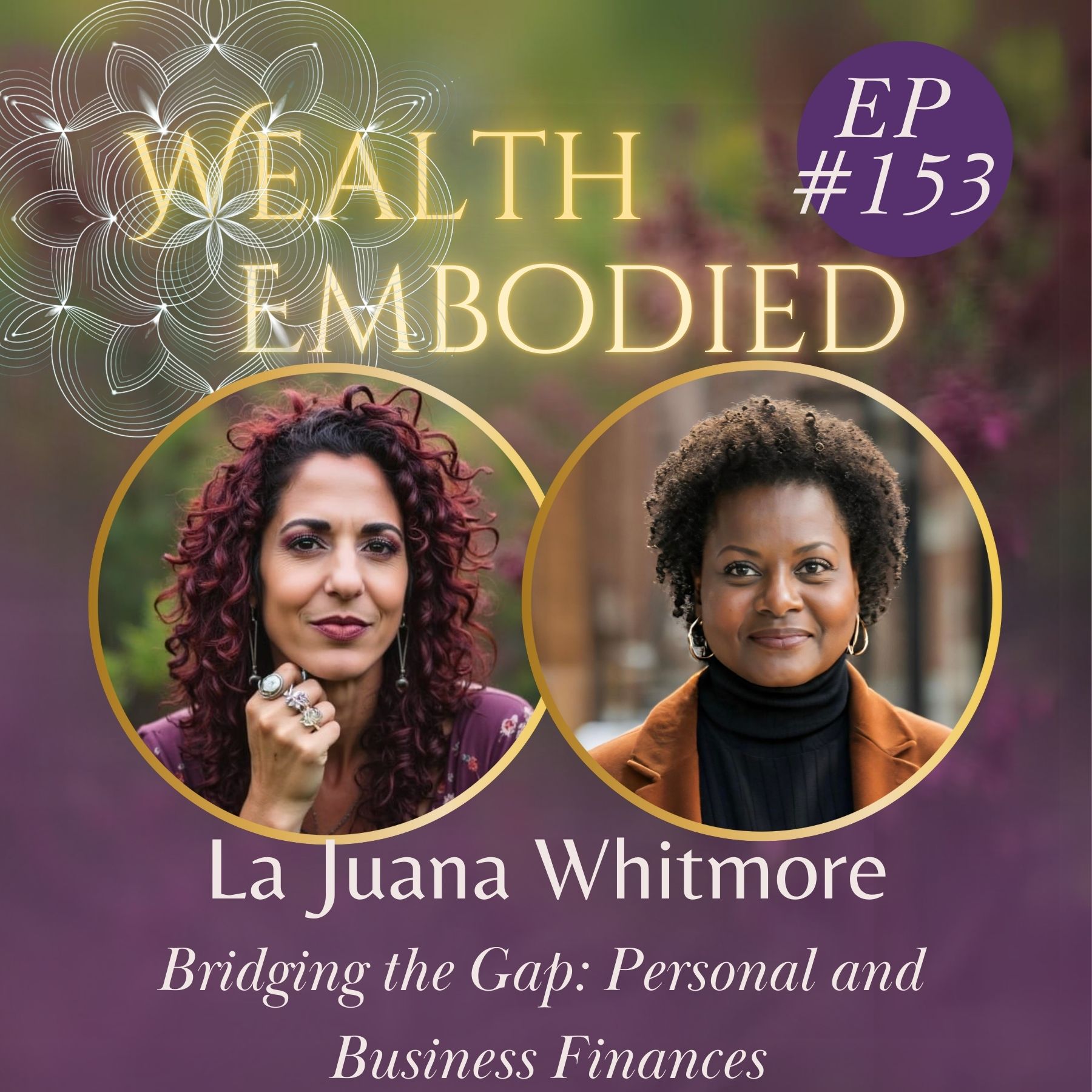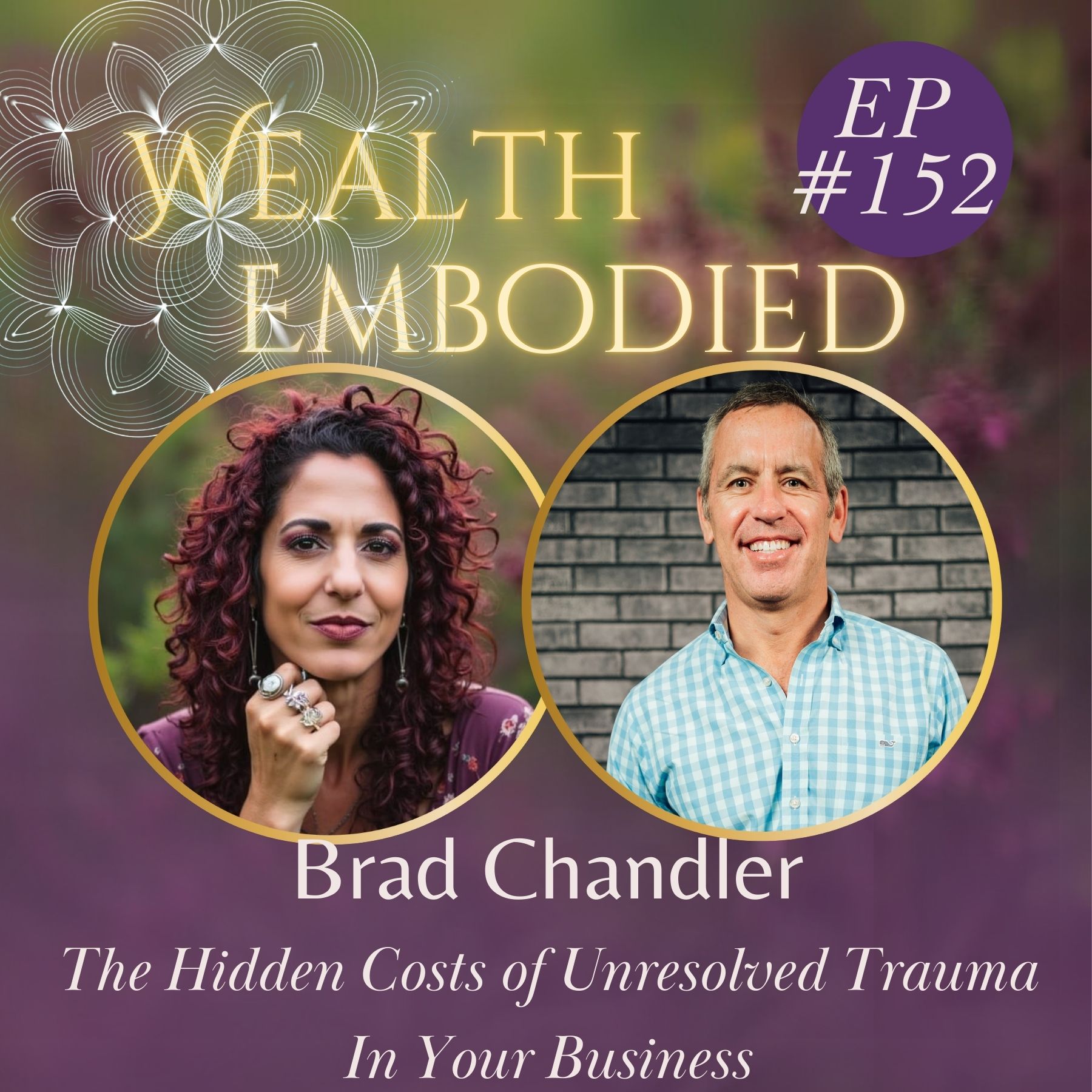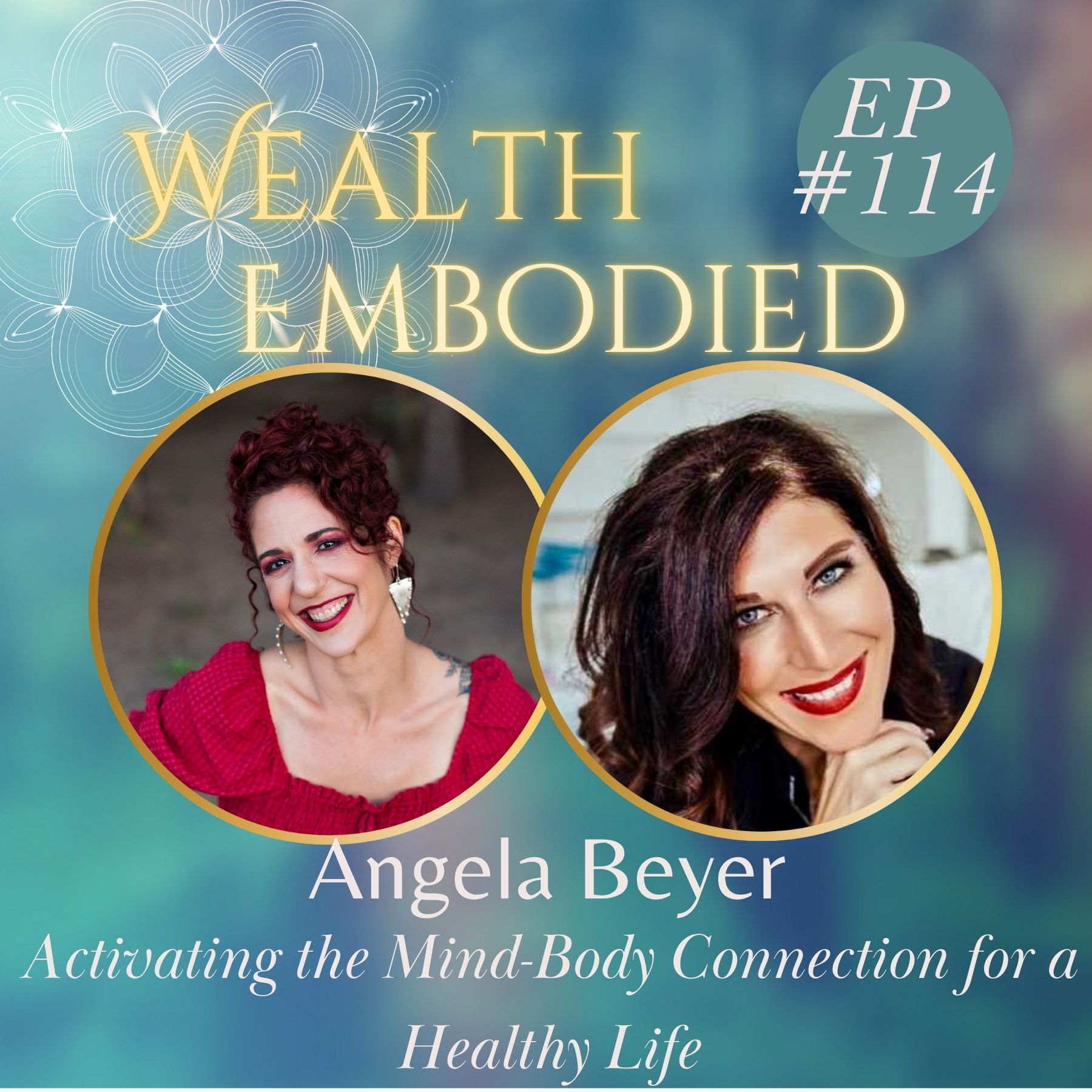Episode Transcript
Alara Sage (00:01.871)
Hello, hello, and welcome to another episode of Wealth Embodied, where we activate and inspire you in wealth consciousness, creative genius, and visionary impact. I'm your host, Alara Sage. And we talk a lot, obviously, on this podcast about wealth, about money. We talk about business. We talk about personal. And where is where those two meet?
your finances, your personal management of your finances and your business finances, your business management. Where do those meet? Is there a gap? And the importance of bridging that gap and why that's important is everything we're going to talk about today with our wonderful guest, Luana Whitmore, who is the founder of Next Femme Financial and the Luana Whitmore Consulting. She is a business strategist.
accredited small business consultant, certified financial education instructor, doctoral candidate, and university professor who is passionate about designing and innovating business models for all types of companies. Welcome, my love, to the show.
La Juana Whitmore (01:15.438)
Hi, thank you for having me. As you can see, I have no life outside of talking about this stuff.
Alara Sage (01:22.731)
That just means you're passionate in my opinion. So I'm all for it. Yes, yes, yes. So let's talk a little bit about what is this gap?
La Juana Whitmore (01:24.748)
Yes, I am. I am super passionate.
La Juana Whitmore (01:35.266)
So, you know, it's interesting how I discovered it or, I didn't discover it, but how I noticed it is working with entrepreneurs over and over again, over the past few years, and everything is wonderful. We're talking about branding, we're talking about customers, we're talking about product, and everyone's excited and happy and they're all in. And as soon as we get to the money part, the finances, it all comes to a screeching halt. I mean, you know, people are like scrambling back, you know, they're
There's some in some cases quitting I even had an entrepreneur say that she didn't care about making money and I'm just like well, okay, so let's let's dig into this and so I started talking to them and usually the the first problem was According to them was that they didn't they weren't good at math, right? I'm not good at math. There's all the math math anxiety And lot of that is rooted in childhood challenges with with math
But I figured it had to be kind of a little bit deeper than that. And so I started asking them once I built rapport is, know, talk to me about how you manage your personal finances. And it was the same thing. Right. So where they were kind of shying away from financial problems or even looking at the numbers, just looking at them, they were doing the same things in their personal life.
And so being the researcher that I am, I started to dig into the research and the studies and right away there are a few things that popped out. It's a problem for most entrepreneurs, so it's not unique. So what I was seeing was kind of validated. And I also saw that when entrepreneurs are really good at managing their personal finances, they are better at managing their business finances and
The next link is then they have better performing businesses. So there's like this kind three-way link here. And so one of the things I started doing is if businesses weren't performing, I actually started going back to what I now consider to be a root cause, which is how are you managing your personal finances? You cannot bring habits from your personal life that you don't have into your business. So let's start there.
Alara Sage (03:54.755)
Yes. And it really is this relationship with money. You know, we're not taught this in school. And I feel like a lot of entrepreneurs, myself included, we start entrepreneurship, we haven't necessarily gone to business school. We haven't had any education on that. And then we're really up against these aspects of the business that we don't understand. And if we're feeling a little bit
La Juana Whitmore (04:00.16)
No.
La Juana Whitmore (04:09.868)
No.
Alara Sage (04:22.647)
apprehensive, they're unconfident. We oftentimes will just avoid addressing it rather than what do I need to educate myself? How do I need to transform? Like you said, my personal habits, my relationship with wealth so that I can feel confident in my business resources. Yeah, it's interesting because they're just not separate really at all. It's the relationship with money.
La Juana Whitmore (04:27.554)
Yes, yes, yeah.
La Juana Whitmore (04:42.05)
Yeah.
La Juana Whitmore (04:48.192)
No, no, they aren't. No, they aren't. The personal and business finances aren't, although they are legally separate, they really aren't, right? Because you are using your business to fund your life. So it's not separate. The two things are not separate. And your relationship with money is embedded and surrounding all of that. And it starts with what I'm calling kind of your money mindset.
Alara Sage (04:56.228)
Yes.
La Juana Whitmore (05:17.3)
what a lot of people don't realize or don't think about is that it all starts when you're kid. It starts with the messages that you hear. It starts with how your parents talked about money or didn't talk about money. We've heard things like money doesn't grow on trees. Well, that gets in your psyche and it embeds in there and it starts to drive how you spend money, how you save money.
how you think about money, whether or not to your point you avoid the conversation altogether. And we also don't talk about it when we grow up. So I think about the few, very, very few conversations I had with my parents about money. I didn't talk to my friends about money. And as a result, we're often pretending like everything's okay when it may or may not be. And you don't even know who else around you
is going through some of the same things. So it's a fascinating thing that we're doing. And I'm old enough to remember, I'm an old old lady, and I remember when I was in school, elementary, junior high, we were taught how to create a budget. That was all part of our home ec education. They don't even do that anymore. So we are getting further and further away from financial education when we should be getting closer to it.
Alara Sage (06:26.426)
Cheers.
Alara Sage (06:34.725)
Mmm.
Alara Sage (06:45.881)
Yeah, I definitely did not learn that in school. And, you know, I loved your comment earlier about math, right? And I hear that a lot as well. And, you know, I honestly was really good with math. I excelled at math in school. That did not translate to managing money at all. That's how you know it's not math. That's my point. It's like, no, it's not the math.
La Juana Whitmore (06:54.391)
Mm-hmm.
La Juana Whitmore (07:06.392)
No, no, that's how you know it's not mad. Right? Yes.
No, no.
Alara Sage (07:14.121)
And of course, that can have a layer. If you don't feel confident with math, yes, that can add a layer to your discomfort and your lack of confidence. But it's really not about the math because, again, I excelled and still found myself like, wait, what? How do I manage money? I don't even understand it. And I don't even know how to take those first steps to accomplish it. And these conversations are so important because I feel like even in our adult world, in business, yeah, there's a lot of talk of like,
La Juana Whitmore (07:31.436)
No.
Alara Sage (07:42.775)
making this much money. There's still no transparency behind that. That if you have a million dollar business, hey, guess what? That doesn't mean you have million dollars in your pocket, right? And that some businesses are creating a lot of revenue, but their profit could be very low or the flip. It's lower revenue, but actually their profit is very high. These conversations don't happen either. So yeah, how do we understand? Let's go back to
La Juana Whitmore (07:44.556)
No, no.
La Juana Whitmore (07:51.852)
Right.
La Juana Whitmore (07:58.542)
Mm-hmm. Yes.
Yeah.
No, no.
Alara Sage (08:13.047)
Understanding the deeper side of the mindset, what do you recommend for people to start in addressing these issues in their business and in their personal finances?
La Juana Whitmore (08:25.464)
Yeah. So I almost, I almost am going to ask people to not even think about the business for this. Let's just put that to the side, work the business the way you've always been working it and focus on your personal finances, starting with an understanding of where you are. It's like, we have to look under the hood first before we can create a plan. have to look right. And so when you are avoiding and when you're not looking, you don't even know what you don't know.
So let's start there. Let's understand what we don't know, what we do know, what we're good at, what we're bad at. We're calling those kind of our financial competencies, right? How do we understand what those are first? And part of that journey is writing what I'm calling your money autobiography. It is an actual narrative story that describes your relationship with money from
when you were born from the very first time you had heard a conversation, had a conversation, the very first dollar you earned, how did it feel? What did you do? So going through a series of prompts that helps you write this story, it helps you understand why you think about money the way you do. If you don't know that, you can't change it. Right? And so you see people taking all of these classes and you know, all, you know, getting, you know, if you don't address
that you cannot move forward. It is impossible. So that's really where we have to start, understanding what you know, what you don't know, and then writing that autobiography. One of the other things that we do in the program is called understanding our saboteurs. And this is a scientifically studied thing where we have these saboteurs, which are awesome. Usually they are there to protect us. They are often presented in
or what we are known for as our strengths. So when I ask people what my strengths are, it's usually strategizing, planning, those kinds of things. And it usually does me really well. It serves me well. Until times of stress and anxiety, and then I over index in those things and it becomes my saboteur. So I end up planning or strategizing to inaction. And so when we understand what our saboteurs are, we can recognize when they kind of start to rear their little heads.
La Juana Whitmore (10:51.464)
And then we can say, all right, here you are. You're trying to take me off course. You're trying to make me spend money on this purse that I don't want to. You're trying to make me do things that are not in alignment with what I want to do. Let me stop you. And then finally, before we, and this is, now this is all before we've even looked at a budget, right? And then finally, we have to understand what your values are, right? What do you value? Because my life,
being successful in financial management does not look like yours. Right? And I think it's funny because I know people judge me for driving a 2001 Kia Soul. I've had my fifth soul. I love that car. It's cheap. It's I can pay cash for it. It's awesome. Right. But that's not part, you know, having a fancy car is not part of my value system. Right. My value system is different.
And so creating a financial world and financial management systems that are in alignment with what you want to do and what your values are is really important. So when I'm working with women and they tell me that their values are like, um, uh, family experiences, but they have a closet full of Prada shoes. That's those two things don't line up. So let's, let's understand what your values are and make sure you're spending and saving.
Alara Sage (12:10.565)
Those are all really beautiful. And I love the first step of the self awareness, right? Because you can't take a car in and have it get fixed, quote unquote, if you don't actually know what needs to be fixed or maybe not even necessarily what's broken, but what's wearing down, right? Where does the attention need to go? And that's the hardest part. Often is just as you said so wonderfully, people will go out and take courses. They will find the content they'll want to give the mind more answers.
La Juana Whitmore (12:22.476)
No.
La Juana Whitmore (12:40.302)
Mm-hmm.
Alara Sage (12:40.953)
But those answers do nothing for you if you don't know how to apply them to your unique situation, which is really that let's look under the hood and recognize you might not even need a course if that's not what's broken, right? If a different part of the car is broken, you know, if the transmission is broken, you don't need to learn how to like, rotate the tires. Like if that's already working for you.
La Juana Whitmore (13:05.738)
Exactly, exactly, exactly. Yep.
Alara Sage (13:08.665)
But that's often I find I love that you bring that up because it's often what people do. Like, let's go find a solution external of ourselves. That just that slowing down, taking that time to really look and recognizing that snow, that's no judgment. You know, it doesn't make you a bad person. No matter how poorly you've managed your finances, it doesn't make you a bad person. Does it make you stupid? It doesn't make you incapable.
La Juana Whitmore (13:14.754)
Yeah. Yeah.
La Juana Whitmore (13:24.236)
No. No.
No, no, no, no. It doesn't, it absolutely doesn't. And I think we almost in a lot of ways treat people that way though, right? Instead of recognizing you can't know what you haven't been taught. You can't understand what you haven't looked at. And so until you kind of lift up the hood, you say, I mean,
But where do you go? can't hand you a budget spreadsheet, no matter how well you know Excel and have you create a budget if you don't understand why you don't save money like you want to. It doesn't work. Yeah.
Alara Sage (14:10.947)
Yeah, absolutely. And I love the conversation of saboteur because that is very powerful. And it kind of goes along with your values because you can see like you use the example of the person who, okay, my value is taking my family and having these wonderful experiences together. I end up spending all my money on shoes or purses or clothing. Like you're sabotaging that real desire, right? Yes.
La Juana Whitmore (14:26.958)
Why?
Right. Why? Why? So the journey is really about asking yourself a lot of questions and we don't do that often, right? We're not encouraged to do it. We're just encouraged to move forward to your point. We're encouraged to feed the brain. We're encouraged to learn. We're encouraged to act and do, but we're never really encouraged to stop and be still and ask the questions of ourselves, right? And so
When we think about what this transformation really takes, a lot of that, almost the first third of it is really getting to know yourself and why you spend and save the way you do.
Alara Sage (15:16.101)
Yeah, I think one of the most powerful kind of examples is in Tarot, there's the Fool card or in the regular card deck, there's the Joker and they are representative not of somebody who's an idiot or doesn't know, but is that state of just presence and curiosity and playfulness, right? Like you said, the asking questions, the curiosity. It's amazing if you just start asking questions without any attachment to answer. Wow. The revelations, right?
La Juana Whitmore (15:35.118)
Mm-hmm.
Alara Sage (15:45.823)
And you start to see the patterns in yourself and in your behavior and in your actions and what that's really pointing to.
La Juana Whitmore (15:48.962)
Yes, absolutely.
La Juana Whitmore (15:53.346)
It's interesting, I worked with a woman once, we were talking about kind of creating her money autobiography. And she talked about how when she was younger, she remembered whenever her mom got paid, they would go shopping, they would go out to eat and they would go shopping. And there were these wonderful memories for her, right? And so she brought that practice into her family. However,
What she didn't know about her mom was that her mom really couldn't afford to do that. And she's finding that it's difficult for her to afford to do that as regularly as she wants to. But so the questions now we have to start, she has to start to ask herself is, what was it really that I valued about that experience? Was it the fact that we bought toys and that we were at a restaurant? Or was it that first time the whole week that my mom got to sit down and she didn't have to cook?
and she didn't have to clean and she got to sit down and we got to talk about our week. Is that what was valuable? And is there a way for you to create that same experience without spending the money that you don't want to spend? And I'm not here to tell people to not spend money. The point is to spend money in alignment with your values.
Alara Sage (17:12.869)
I love that shift of perspective so much because it's also about recognizing there's always deeper truths to what we really are experiencing in life and why we want those experiences. And those experiences actually have nothing to do with money. So you can grant yourself those experiences just so like you so wonderfully put that connection, that presence together. And you start to create that abundance through those experiences.
La Juana Whitmore (17:14.637)
Mm-hmm.
La Juana Whitmore (17:20.256)
Yeah
La Juana Whitmore (17:25.251)
Mm-hmm.
La Juana Whitmore (17:29.389)
No.
La Juana Whitmore (17:40.942)
Mm-hmm.
Alara Sage (17:42.039)
And then it actually spills out into your physical reality rather than, okay, if I want to live a wealthy life, I have to go spend a bunch of money to live that life. You can actually train yourself ways to live luxuriously that are aligned with your values that start to create that first and foremost. Then the wealthy life starts to be created from those experiences.
La Juana Whitmore (17:46.05)
Exactly.
La Juana Whitmore (17:50.934)
Right. Yep.
La Juana Whitmore (17:56.686)
Mm-hmm.
La Juana Whitmore (18:05.354)
Exactly, Yep, that's absolutely true.
Alara Sage (18:09.667)
So in this process that you help people with, which is so beautiful, what has been some of the most profound transformations of people address their personal finances? What do you see happens with the business?
La Juana Whitmore (18:26.21)
Yeah, so what initially happens and again, is, know, my next FEM program is really focused on their personal finances. But one of the first things that happens is that they start to realize why, why, why, why they really started to think about, I remember when my parents were arguing about that. I remember when my mom said this, or I remember
when I got my first job and I got that first check and what I did with it. These are memories that are buried from our awareness, but are always there in our actions and our behaviors. And so there are often tears. are often just kind of this feeling of relief. Like now I know.
Now I know, right? Now I know why, now I know how, and now I know what, right? So now I know. So that relief ends up, because like we said, it's not about math. Some of that relief ends up spilling into how they want to manage and how they start digging into their business finances. And one of the things that I say to people is that this isn't about,
Addition, subtraction, multiplication, and division, because most of us can do that. If it were about those four things, then we wouldn't know, we wouldn't have any problems, right? Most of us can do that. This is about logic on one hand and mindset on the other. And so what ends up happening, the first thing is that they actually want to look at their, their business finances. They want to understand what all of the statements mean. They want to understand why the line items are what they are, how those things are.
connected, which levers they can pull to change things. And they end up not being a victim, right? They end up being more in control because now they understand and they know they want to know more. want to learn more. So when you are, when you move from being a victim of what is quote unquote happening to you and happening around you and you have agency or you believe you have agency, all things change.
La Juana Whitmore (20:49.58)
Right? Because you become courageous. you become inquisitive. You are no longer hiding. you are no longer, you know, kind of getting beaten up by the quote unquote circumstances around you. and so that's really a lot of the transformation that's happening is that women want to do, like they start to almost reject that girl math. Like I hate that by the way, that girl math trend on the internet. I hate that.
Alara Sage (21:16.527)
Who ever said that?
La Juana Whitmore (21:18.356)
I hate it to my core. It is the worst thing ever. But they start to kind of reject that mindset of, I'm not supposed to know how to do this, or I never knew how, so I can't. They actually want to learn. So that's the first step.
Alara Sage (21:34.053)
That's a huge transformation. And when we feel that empowerment, it really gives us the opportunity to make more powerful choices because you're not in that avoidance. You're not in that. don't understand. Gee, I don't have clarity. I'm lacking conviction or confidence. I'm just going to react versus like, I'm a boss of my business. I know where my numbers are. I feel confident in how to work with my numbers.
La Juana Whitmore (21:35.693)
Mm-hmm.
La Juana Whitmore (21:46.446)
Mm-hmm.
La Juana Whitmore (21:57.282)
Yes.
Alara Sage (22:01.645)
Now I can respond to my environment and make those very powerful decisions.
La Juana Whitmore (22:04.11)
Yep. And you're, and you're making decisions based on fact and not feeling. And that is a huge change in a business. And, um, and you know, what's wonderful about business is a lot of us get into business because of feeling, right? Um, but when we don't make the transition to making decisions based on data and fact, that's oftentimes when things start to fail.
Alara Sage (22:12.879)
huge.
huge.
La Juana Whitmore (22:31.886)
So once you start to become curious about your financials, you start to become curious about other numbers based things, right? Like how to find a location that's right for your business based on traffic patterns and populations, how to identify who your customers are and how much they can bring to your business based on those fact based things. so like, you know, so psychographics and demographics, right?
so you start to become more curious about those things. It's interesting. It's, when I think about, a client that I worked with an entrepreneur that worked with a couple of years ago. she really wanted a store in the mall, clothing store in the mall, regardless of the data that I, that I threw at her. And this was before I started to think about why people shied away from this kind of database decision making and numbers.
And I could not get her to a place where she would look at the trends in mall shopping and all of that stuff to make a decision that was actually better for her. And I regret not knowing or not really kind of digging into what I've gotten to now in order to help her, knowing that it really was, she was relying on her feelings. She was afraid of the numbers. She was afraid of the data. She didn't want to dig into it because it wasn't how she had.
traditionally thought about her business. So yeah.
Alara Sage (24:03.011)
Yeah, and not to say she couldn't have done her business, right? It just maybe needed to be in a different way. But yeah, again, resisting. Yeah.
La Juana Whitmore (24:06.702)
Yes, absolutely. There were other options. Again, we are in this amazing world right now where there are so many ways to have a business and to make money that settling on this one thing is not only unnecessary, but it could be detrimental in terms of how you run your business.
Alara Sage (24:17.957)
Yeah.
Alara Sage (24:30.957)
Yeah, very limiting. Yeah, wonderful. And so how can people find you, reach out to you?
La Juana Whitmore (24:39.382)
Yeah. So if you want to reach out to me personally, I am the only Ljuanah Witmore in the world. So if you put my name in Google, that's all me. It's all me if you put my name in Google, but you can connect with me on LinkedIn. If you want to get started understanding what you know and what you don't know, you can take our wealth wellness quiz at nextfemfinancial.com. It's right there on the homepage.
Alara Sage (24:45.246)
Hey!
Alara Sage (25:06.853)
And I will make sure to have that link there. Thank you so much for bringing your wisdom and your expertise, your knowledge into the space. It's very appreciated.
La Juana Whitmore (25:09.592)
Great. Thank you.
La Juana Whitmore (25:18.094)
Thank you so much for having me. I appreciate it.
Alara Sage (25:21.069)
And to the audience, always having these money conversations. Have you looked under the hood? Are you separating your personal finances in your business and pretending that it doesn't matter whether you have any real relationship to money or not? These are all such powerful questions, and it could radically transform your life. So ask them. Ask them. Ask the questions. Get curious. Check out what LaWanna has.
La Juana Whitmore (25:46.99)
Mm-hmm.
Alara Sage (25:50.757)
reach out to her if you feel called. Share this episode with others because these conversations, as we said earlier, they need to be had. They need to be had. We need to have these conversations so we can get rid of all this distortion around money and we can actually just all live healthier, happier lives. Thank you so much for being a part of the audience. I appreciate you very much. Until next time.






